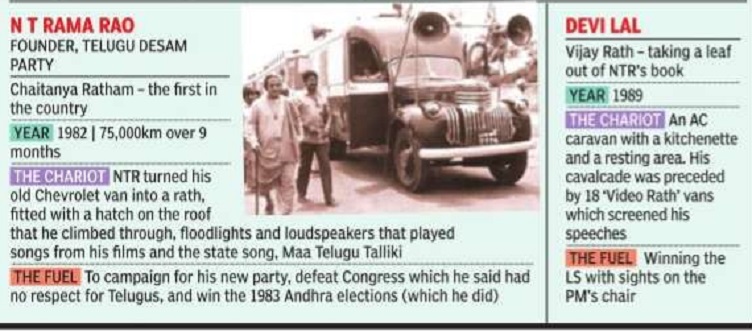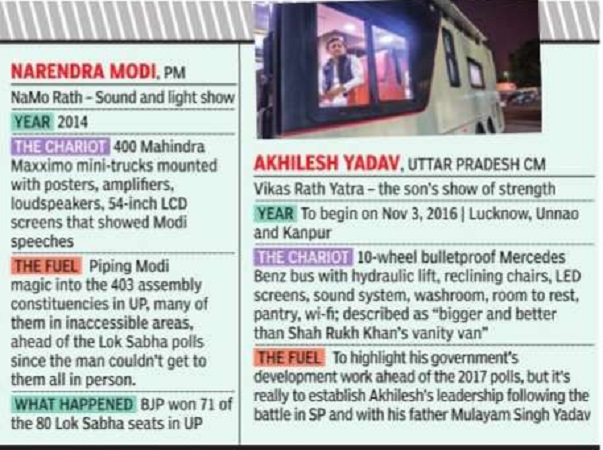India: A political history, 1947 onwards
(→Election symbols) |
(→Election symbols) |
||
| Line 31: | Line 31: | ||
More importantly , the bulk of the 33.5 crore votes polled by the rest has gone to parties like Samajwadi Party, Bahujan Samaj Party, Trinamool Congress, Biju Janata Dal, All India Anna Dravida Munnetra Kazhagam (AIADMK) and the Left in Kerala or Tripura which are not aligned with either of the two national parties. | More importantly , the bulk of the 33.5 crore votes polled by the rest has gone to parties like Samajwadi Party, Bahujan Samaj Party, Trinamool Congress, Biju Janata Dal, All India Anna Dravida Munnetra Kazhagam (AIADMK) and the Left in Kerala or Tripura which are not aligned with either of the two national parties. | ||
| − | |||
| − | |||
| − | |||
| − | |||
| − | |||
| − | |||
| − | |||
| − | |||
| − | |||
| − | |||
| − | |||
| − | |||
| − | |||
| − | |||
| − | |||
| − | |||
| − | |||
| − | |||
| − | |||
| − | |||
| − | |||
| − | |||
| − | |||
| − | |||
| − | |||
| − | |||
| − | |||
| − | |||
| − | |||
| − | |||
=2016: Some facts= | =2016: Some facts= | ||
Revision as of 09:12, 12 March 2017
This is a collection of articles archived for the excellence of their content. |
Contents |
Raths (chariots), 1982-2016
See graphics on this page and on the page Samajwadi Party

The Times of India

The Times of India

The Times of India
2011-2016 changing political landscape


`Others' got more seats than BJP + Cong in 30 polls (2012-16)
The Times of India, May 21 2016
That BJP has gradually replaced Congress as the dominant party in Indian politics and that recent assembly polls have accelerated that trend is obvious, but the reality is that between them, the two national parties have won less than half the seats and votes polled in the latest assembly polls in 28 states (excluding Telangana, which was part of Andhra Pradesh when the last elections were held there) and two union territories, Delhi and Puducherry . In these 30 elections dating from 2012 and including the fi ve just concluded, a total of 4,117 seats were up for grabs.BJP has secured a decisive lead over Congress by winning 1,051 of them against the latter's 871. That makes a combi ned total of 1,922 seats. But all other parties put together have won 2,195 seats, or more than half the total. Seat tallies can be a mis leading indicator of po litical dominance. This is not only because a party can get a lot of votes but hardly any seats in the first past the post system, but also because an MLA in, say, Sikkim, represents a much smaller population than one in Uttar Pradesh but both count as one in the tally.
A better indicator, therefore, is how many votes each party has won. Here again, BJP's combined tally of 12.6 crore votes from the 30 polls beats the Congress' 11.8 crore, even if the gap seems crore, even if the gap seems much smaller than in the seats. Again, though, the rest with 33.5 crore votes comfortably beat the combined tally of the two big national parties. BJP and Congress put together have won 42% of the votes polled, 58% going to the rest.
Some of this 58% has, of course, gone to allies of BJP or Congress, like Shiv Sena or Akalis in the case of BJP, or DMK and RJD in the case of Congress. Nevertheless, these are not votes won by the two national parties on their own.
More importantly , the bulk of the 33.5 crore votes polled by the rest has gone to parties like Samajwadi Party, Bahujan Samaj Party, Trinamool Congress, Biju Janata Dal, All India Anna Dravida Munnetra Kazhagam (AIADMK) and the Left in Kerala or Tripura which are not aligned with either of the two national parties.
2016: Some facts
The Times of India, January 1, 2017
1. India-China relationship: Relations between India and China in 2016 continued to be complicated. China's protection for Pakistan-based Jaish-e-Muhammad chief Masood Azhar, its opposition to India's membership of the Nuclear Suppliers Group, its plans to construct dams on upper reaches of the Brahmaputra, and territorial disputes at the Line of Actual Control are among the contentious issues that strain the China-India relationship.
Former Tata Group chairman Cyrus Mistry's (right) ouster, and the ongoing feud between Mistry and interim Tata chairman Ratan Tata, are two other major events that occurred in 2016.
2. Demonetisation: Demonetisation, note ban, currency ban - whatever you wish to call it, this was easily the most significant event of 2016 in India. Prime Minister Narendra Modi told the nation on November 8 that the old Rs 500 and Rs 1,000 notes (picture) would be removed from circulation. The move created a cash crunch, which the government made efforts to ease - by releasing new Rs 500 and Rs 2,000 notes, and creating incentives for digital transactions. A 50-day window during which citizens could deposit old notes at banks ended on December 30.
3. Cashless economy: Ever since demonetisation was announced, the government has taken steps to promote digital transactions and a cashless economy. For example, it launched lucky draws with prizes for both consumers and businessmen who use cashless transactions, and doubled the balance limit of Prepaid Payment Instruments. The Finance Ministry announced eleven mesures to promote digital payments, including discounts on purchases of petrol and diesel. And finally, Prime Minister Modi launched a digital payments app, Bharat Interface for Money or BHIM, on December 30.
4. GST: In August, the Parliament passed the landmark Goods and Services Tax (GST) Bill, which aims to create a unified market by doing away with inter-state tax barriers. However, there's been an impasse in the GST Council (picture) over the division of authority between assessing authorities of centre and states, and the issue will be taken up together at the council's meeting on January 3-4, 2017.
5. Fast end by Iron Sharmila: In August, Manipuri human rights activist Irom Sharmila ended a 16 year fast that she'd begun to protest against the Armed Forces Special Powers Act. She later created her own political party - the People's Resurgence and Justice Alliance.
6. Death of J. Jayalalitha: Former Tamil Nadu Chief Minister and All India Anna Dravida Munntra Kazhagam supremo J Jayalalithaa, an icon of Dravidian politics, breathed her last on December 5. She was buried next to her mentor, former Tamil Nadu Chief Minister M G Ramachandran, who also starred in several films with her during her glittering Kollywood career. After Jayalalithaa's demise, her close friend and confidante Sasikala Natarajan (left) took over as general secretary of the AIADMK on December 31.
7. Terror in Kashmir valley: The Kashmir valley witnessed several months of unrest after Hizbul Mujahideen terrorist Burhan Wani was killed in an encounter with security forces on July 8. The unrest affected normal life, and resulted in shutdown of schools and death of 86 people. The government had also to grapple with the NIT unrest, mysterious school burning incidents and blinding due to pellet gun firing issues.
8. Legion: Legion, a group of hackers, was in the news for compromising e-mail and Twitter accounts of Congress vice-president Rahul Gandhi (picture), liquor baron Vijay Mallya, and two prominent senior journalists. A member of the group shared with TOI a list of what he claimed are email addresses and passwords of nearly 74,000 chartered accountants in the country. He said he had compromised the accounts of former Indian Premier League chairman Lalit Modi, and the sansad.nic.in domain, though the data is yet to be dumped.
9. PM Narendra Modi: It's been an eventful year for Prime Minister Narendra Modi, who was declared Person of the Year by the readers of TIME magazine. His government implemented demonetisation, and the Army conducted surgical strikes across the Line of Control after the Uri attack. He made several state visits, made a historic speech in the US Congress in 2016.
10. Olympics: It was a special year for India at the Olympic Games and at the Paralympic Games in Rio. PV Sindhu clinched the silver medal in the womens' singles badminton final, and Sakshi Malik won the bronze medal in the women's wrestling event. Dipa Karmakar became the first Indian gymnast to reach an Olympic final. Four Indian Paralympians - Mariyappan Thangavelu (gold, men's T42 high jump), Devendra Jhajharia (gold, men's F46 javelin throw), Deepa Malik (silver, women's F53 shot put) and Varun Singh Bhati (bronze, men's T42 high jump) - also made the nation proud at the Rio Paralympics.
11. India-Pakistan relationship:Pakistan's relationship with India has deteriorated significantly in 2016, after Pakistan-sponsored terrorist attacks in Pathankot (Punjab) and Uri (Jammu and Kashmir), the unrest in the Kashmir valley after the death of terrorist Burhan Wani (whom Pakistan Prime Minister Nawaz Sharif called a 'martyr), India's surgical strikes in Pakistan-occupied Kashmir, and diplomatic efforts made by India to isolate its neighbour on the world stage.
In September, the US and China - the world's top two emitters of greenhouse gases - ratified the Paris Climate agreement - which was approved by 195 countries, including India, in December last year.
12. RBI: Raghuram Rajan, the former governor of the Reserve Bank of India, made way for currenct RBI chief Urijit Patel on September 4. Rajan's resignation came earlier in the year after BJP leader Subramanian Swamy wrote to Prime Minister Narendra Modi to accuse Rajan of "harming the nation's economy." Former Finance Minister P Chidambaram said he was "profoundly saddened" by Rajan's decision, and blamed the BJP-led government for his exit.
The RBI was often in the news in November and December, as it announced frequent rule changes after Prime Minister Modi announced demonetisation.
13. Surgical strike: Just days after the September 19 terrorist attack in Uri, Jammu and Kashmir, India's Director General of Military Operations Lt Gen Ranbir Singh announced that the Army had conducted surgical strikes' on terrorist launch pads across the Line of Control. Surgical strikes are military operations undertaken by forces across the world to move on the offensive, hit enemy targets and installations, and return to primary positions - all with lightening speed and with the added precaution of suffering limited casualty.
14. Uri attack: On September 19, terrorists crossed the Line of Control and attacked an army camp in Uri, Jammu and Kashmir, killing 19 jawans. The attack sparked outrage across the nation, and just days later, the Indian Army responded by conducting surgical strikes on terror launch pads across the LoC. The Uri attack was just one of several events in 2016 that have led to a marked deterioration in the India-Pakistan relationship.
15. Vijay Mallya: Beleaguered liquor baron Vijay Mallya owes over Rs 9,000 crore to a consortium of banks. The United Breweries boss left India in March this year, and has received several summons from the Enforcement Directorate in connection with its money laundering probe. However, he has avoided personal appearance so far.
16. India beat Belgium 2-1 to win the 2016 Hockey Junior World Cup at Major Dhyan Chand Stadium in Lucknow. The last time the Indian junior team had won the title was in 2001.
17. Sawajwadi Party: A feud within the Yadav clan headed by Samajwadi Party supremo Mulayam Singh Yadav reached boiling point on December 30, when Mulayam expelled his son, Uttar Pradesh Chief Minister Akhilesh Yadav, from the party for six years. However, Akhilesh was reinstated the very next day.